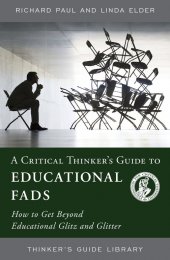A Critical Thinker's Guide to Educational Fads How to Get Beyond Educational Glitz and Glitter
Contact Info for Rowman & Littlefield:
- Toll free: (800) 462-6420 ext. 3024
- Fax: (800) 338-4550
- Orders to orders@rowman.com
- Queries to customercare@rowman.com
The history of education is also the history of short-term solutions to deep-seated educational problems. While programs like No Child Left Behind or Common Core Curriculum are well-intentioned, they result in intense fragmentation of energy and resources in schools. This guide critiques many current educational trends and fads, illuminating their underlying motivations and providing holistic, sustainable solutions.
Teachers, school administrators, and policy makers will find this book an eye-opening overview of education trends and fads, and a refreshing outlook on future reform.
As part of the Thinker’s Guide Library, this book advances the mission of the Foundation for Critical Thinking to promote fairminded critical societies through cultivating essential intellectual abilities and virtues across every field of study across world.
Rowman & Littlefield Publishers / The Foundation for Critical Thinking
Pages: 96 • Trim: 6 x 8
978-0-944583-34-0 • Paperback • January 2007
978-1-5381-3391-0 • eBook • June 2019
Series:
Thinker's Guide Library
$28.00
Additional Information About:
A Critical Thinker's Guide to Educational Fads How to Get Beyond Educational Glitz and Glitter
Why An Educational Fads Thinker's Guide?
Most people are overwhelmed by the sheer mass of educational fads. Most educators feel pulled in a variety of directions by them. Some become passionate devotees of one of the fads at the expense of substantive education. And virtually all educational trends with any substance are transformed into fads by a flawed or superficial understanding of the basic idea behind the trend combined with a non-substantive concept of education to begin with.
Most educational trends or fads originate in reasonable ideas. All reasonable ideas about education enhance instruction when integrated into a substantive concept of education. They fail when imposed upon instruction through a non-substantive, fragmented conception of education, which is unfortunately typically the case in schooling today. In this guide, we briefly critique many of the current educational trends and fads. Our goal is to make the basic idea behind each of these fads intelligible so that its proper use — and likely misuse — can be taken into account. It is our aim to provide the reader with key questions to be raised in discussing these ideas. Each trend or fad is commented upon in three ways:
- the essential idea behind the trend or fad,
- the proper educational use (when integrated into a substantive concept of education), and
- the likely misuse (when the idea is unreasonably applied).
It It is time to recognize that education will never be improved by educational fads, and that the manner in which educational trends are marketed guarantees that they will be transformed into fads. Fads by their nature are fated to self-destruction. Parents, educators, and citizen activists need to understand the problem of educational fads so that they can effectively distinguish substantive efforts at educational reform from superficial ones.
Our goal is to provide a foundation that can be used to put all educational trends/fads into immediate perspective, making it possible for interested persons to grasp the essential idea and understand the potential use and misuse of that idea. With these understandings one can make sense of discussions of educational reform issues. One can then formulate the relevant and substantial questions and seek the answers one deserves.
Contents Include:
- Educational Fads
- Substantive and Non-Substantive Concepts of Education
- A Substantive Concept of Education (The Educated Person)
- A Substantive Concept of Education (The Educational Process)
- Fixing the Schools (Substantively)
- Attaining Substantive Education
- Educational Fads & Trends
- Alignment
- Assessment
- Authentic Pedagogy & Assessment
- Block Scheduling
- Bloom’s Taxonomy
- Brain-Based Teaching & Learning
- Character Education
- Charter Schools
- Choice (Vouchers & Privatization)
- Constructivism
- Cooperative Learning
- Core Knowledge
- Creative Thinking
- Critical Thinking
- Cultural Literacy
- Didactic Teaching
- Emotional Intelligence
- Feminist & Gender Issues
- Gifted Education
- Global Education
- Inquiry-Based Teaching
- Intelligence
- Integrated Curriculum
- Learning Styles
- Multiculturalism
- Multiple Intelligences
- No Child Left Behind
- Outcome-Based Education (or Standards-Based Education)
- Phonics vs. Whole Language
- Portfolio-Based or Alternative Assessment
- Problem Solving
- “Raise the Standards” Movement
- Restructuring Schools Movement
- School-Based Management
- School Choice
- School-to-Work Movement
- Self-Esteem Movement
- Socratic Questioning
- Teaching For Understanding
- Thematic Curriculum
